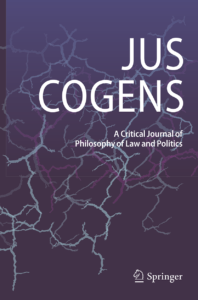Soft Law in Hard Times
Seasoned court watchers were no doubt surprised by the English High Court’s decision to overturn the British Home Secretary’s decision to proscribe Palestine Action. For anybody even casually familiar with British courts’ approach to national security-related matters, the odds of success were not good. The judgment is certainly not a slam-dunk victory for Palestine Action and it is replete with extensive discussion condemning the actions of the group. And yet despite these admonishments, the judgment intimates at wider concerns as to the role of counter-terrorism legislation in liberal democracies
Continue reading >>High Thresholds and Wide Margins
The European Court of Human Rights (ECtHR) issued an inadmissibility declaration in the climate case of Fliegenschnee and Others v. Austria. While an unsuccessful outcome was expected, the decision nevertheless clarifies three aspects of the Court’s climate jurisprudence. Taken together, the case shows that the Court neither demanded more than in previous cases nor reneged on its requirements as laid down in Verein KlimaSeniorinnen Schweiz and Others v. Switzerland.
Continue reading >>Nationalization Nonsense
Fueled by resentment, xenophobia, and, one can assume, a growing awareness of his party’s diminishing prospects in the upcoming midterms, President Trump recently suggested that his party “nationalize” elections. As every expert to have weighed in on the matter has noted, the claim is preposterous. Simply put, the President has no direct authority over elections. While there are legitimate fears about Trump’s willingness to interfere with this Fall’s elections, he has no power to assume the control he desires.
Continue reading >>Peace by Chairman
Das Board of Peace, gegründet am Rande des Weltwirtschaftsforums in Davos, inszeniert sich als pragmatischer Gegenentwurf zu den Vereinten Nationen. 60 Staaten wurden zur Mitarbeit eingeladen, 21 erklärten ihre Bereitschaft zum Beitritt. In Europa überwog jedoch die Skepsis. In Deutschland ist diese Skepsis auch verfassungsrechtlich begründet: Das Board weist institutionelle Defizite auf, konzentriert Entscheidungsbefugnisse und ist nicht hinreichend an die Mitgliedstaaten rückgebunden.
Continue reading >>KI ohne Verantwortung?
Auf X Corp zeigte sich binnen weniger Tage, wie die Integration des KI-Tools Grok sexualisierte Deepfakes realer Frauen und Minderjähriger massenhaft hervorbrachte und verbreitete. Die Vorgänge verweisen nicht nur auf individuelles Fehlverhalten, sondern auf eine strukturelle Verantwortungsfrage, wenn Erzeugungs-, Verbreitungs- und Gestaltungsmacht in einer Plattform gebündelt sind. Der Fall stellt damit die dogmatische Reichweite des Strafrechts gegenüber privaten Infrastrukturbetreibern grundlegend zur Disposition – auch mit Blick auf Elon Musk als zentralen Entscheidungsträger.
Continue reading >>„In Bonn haben wir ja die Gleichberechtigung der Frau beschlossen.“
Mit der „Kampfansage “ führender SPD-Politikerinnen, die bei einer erneuten Wahlrechtsreform Vorkehrungen für eine geschlechterparitätische Besetzung des Bundestages fordern, geht die Debatte über ein paritätisches Wahlrecht in die nächste Runde. Der rechtswissenschaftliche Paritätsdiskurs hat sich hingegen in eine Sackgasse manövriert. Einen Ausweg kann eine verfassungsgeschichtliche Perspektive bieten, zumal die historische Dimension der Paritätsfrage auffällig unterbelichtet ist.
Continue reading >>Karlsruher Sicherheitskonferenz
Das Bundesverfassungsgericht hat eine von einem im Gazastreifen lebenden Palästinenser erhobene Verfassungsbeschwerde nicht zur Entscheidung angenommen. Pünktlich zur Münchener Sicherheitskonferenz konnte Karlsruhe grünes Licht geben: Die Bundesregierung hat freie Hand. Gewalt geht immer von den anderen aus: von den Amerikanern in Ramstein, von den deutschen Rüstungsfirmen, von der IDF. In der Mitte die Bundesregierung als die große Unterlassende mit einem ganz weit bemessenen Spielraum zur eigenverantwortlichen Aufgabenwahrnehmung im Bereich der auswärtigen Politik.
Continue reading >>Drawing Red Lines
Lately, there has been much talk of “red lines” in German politics. Take, for instance, the recent recommendations of the conservative think tank Republik21 on how to deal with the so-called “New Right”, according to which the “Brandmauer” policy of strict exclusion of the AfD should be replaced with differentiated red lines. CDU and CSU should in future determine their course on the basis of what is “constitutionally permissible” and what is “politically capable of commanding consent”. In other words: the question of what counts as a red line when forming majorities with the AfD, where it runs and what it separates from what, is, according to R21, something conservatives should answer by looking into the Basic Law – or into the mirror. Can that work?
Continue reading >>Rote Linien ziehen
Neuerdings ist viel von „roten Linien“ die Rede. So empfiehlt etwa die konservative Denkfabrik Republik21 der sogenannten bürgerlichen Politik, für den Umgang mit sogenannten neuen Rechten „rote Linien“ zu ziehen statt „Brandmauern“ zu bauen. Deren Verlauf sollten CDU und CSU künftig anhand des „verfassungsrechtlich Zulässigen“ sowie des „politisch Zustimmungsfähigen“ ermitteln. Mit anderen Worten: Die Frage, was beim Bilden von Mehrheiten mit der AfD als rote Linie gilt, wo sie verläuft und was sie wovon abgrenzt, sollen die Konservativen laut R21 durch einen Blick ins Grundgesetz bzw. in den Spiegel beantworten. Kann das funktionieren?
Continue reading >>Frontex Under Scrutiny
In the evolving landscape of EU border accountability, the Court of Justice of the European Union delivered its ruling in Hamoudi v Frontex (C-136/24 P) on 18 December 2025. This Grand Chamber decision not only reversed the General Court’s dismissal but also fundamentally recalibrated the evidentiary standards for establishing Frontex’s liability for fundamental rights violations. As FM v Frontex (T-511/24), a closely related case, awaits its judgment, Hamoudi’s legacy in establishing Frontex’s accountability and lowering the burden of proof for vulnerable migrants, promises to reshape its outcome.
Continue reading >>CURRENT DEBATES
Reflexive Globalisation and the Law
In October 2025, a new Centre for Advanced Studies was established at the Humboldt University of Berlin’s Law Faculty. Named “Reflexive Globalisation and the Law: Colonial Legacies and their Implications in the 21st Century” (RefLex), the Centre explores the premise that the globalisation of law and legal discourse has entered a reflexive phase: one in which law and knowledge production about law are less and less one-directional exports from or within the Global North but rather dynamic, multidirectional exchanges that confront colonial legacies, epistemic hierarchies, and enduring asymmetries of power. This blog symposium, co-edited by Philipp Dann, Florian Jeßberger, and Kalika Mehta, aims to present and extend these interactions to a broader, accessible dialogue with a wider community beyond the university setting. Featuring contributions from a range of different disciplines and regions, the symposium serves as a public prelude to its official launch, which can be watched live here.
Read all articles >>Wem gehört die Wissenschaft?
Wem gehört die Wissenschaft – und wem sollte sie gehören? Obwohl Wissen als öffentliches Gut prinzipiell unbegrenzt teilbar ist, wird der Zugang zu wissenschaftlichen Publikationen und Infrastrukturen durch ökonomische und rechtliche Strukturen beschränkt. Zwischen kommerziellen Verlagsmodellen, staatlicher Finanzierung und Community-getragenen Open-Access-Initiativen stellen sich grundlegende Fragen nach Eigentum, Verantwortung und Unabhängigkeit wissenschaftlicher Arbeit. Das Blog-Symposium „Wem gehört die Wissenschaft?“ greift diese Frage auf und beleuchtet Facetten der Organisation von Wissenschaft als Gemeingut, der Eigentums- und Machtverhältnisse im Publikationssystem und der Bedingungen offener und freier Wissensproduktion.
Read all articles >>ADVERTISEMENT
 Volume 7,
Volume 7,Issue 2
July 2025
JUS COGENS
-
Killing Hitler Word by Word: The Oath as Apocalyptic Lawmaking
GREGOR NOLL
-
Adjudicating Climate Protest as a Tool of Modern Republicanism
DMITRII KUZNETSOV
OUR LATEST PUBLICATION
Maria Antonia Tigre, Maxim Bönnemann & Antoine De Spiegeleir (eds.)
The ICJ’s Advisory Opinion on Climate Change
The International Court of Justice’s Advisory Opinion on Obligations of States in Respect of Climate Change marks the most consequential development in international climate law since the adoption of the Paris Agreement. Bringing together leading scholars and practitioners from across the globe, this book offers the first comprehensive and critical examination of the opinion, exploring its doctrinal foundations, normative implications, and potential to reshape global climate governance.
Discover the Open Access digital edition here.
PROJECTS
VB Security and Crime
In cooperation with:
VB Security and Crime is a cooperation of the Max Planck Institute for the Study of Crime, Security and Law (MPI-CSL) and the Verfassungsblog in the areas of public security law and criminal law. The MPI-CSL Institute is a member of the Max Planck Law network.
Das Justiz-Projekt

Weltweit gerät die unabhängige und unparteiische Justiz unter den Druck des autoritären Populismus.
Wie verwundbar ist die rechtsprechende Gewalt in Deutschland – im Bund und in den Ländern?
VB Security and Crime
In cooperation with:
VB Security and Crime is a cooperation of the Max Planck Institute for the Study of Crime, Security and Law (MPI-CSL) and the Verfassungsblog in the areas of public security law and criminal law. The MPI-CSL Institute is a member of the Max Planck Law network.
EDITORIAL
Drawing Red Lines
Lately, there has been much talk of “red lines” in German politics. Take, for instance, the recent recommendations of the conservative think tank Republik21 on how to deal with the so-called “New Right”, according to which the “Brandmauer” policy of strict exclusion of the AfD should be replaced with differentiated red lines. CDU and CSU should in future determine their course on the basis of what is “constitutionally permissible” and
Continue reading >>Rote Linien ziehen
Neuerdings ist viel von „roten Linien“ die Rede. So empfiehlt etwa die konservative Denkfabrik Republik21 der sogenannten bürgerlichen Politik, für den Umgang mit sogenannten neuen Rechten „rote Linien“ zu ziehen statt „Brandmauern“ zu bauen. Deren Verlauf sollten CDU und CSU künftig anhand des „verfassungsrechtlich Zulässigen“ sowie des „politisch Zustimmungsfähigen“ ermitteln. Mit anderen Worten: Die Frage, was beim Bilden von Mehrheiten mit der AfD als rote Linie gilt, wo sie verläuft
Continue reading >>



